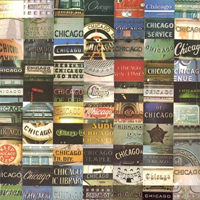Greatest Hits, Volume II (Chicago album)
| Greatest Hits, Volume II | ||||
|---|---|---|---|---|
 | ||||
| Compilation album by | ||||
| Released | November 23, 1981 | |||
| Genre | Rock | |||
| Length | 35:49 | |||
| Label | Columbia | |||
| Producer | James William Guercio, Phil Ramone and Chicago | |||
| Chicago chronology | ||||
| ||||
| Chicago compilation chronology | ||||
| ||||
| Review scores | |
|---|---|
| Source | Rating |
| AllMusic | |
Greatest Hits, Volume II is the second greatest hits album by American rock band Chicago, released on November 23, 1981 by Columbia Records.
Background
[edit]Following the poor reception of 1980's Chicago XIV, Columbia Records dropped Chicago from its roster and cancelled a lucrative contract that had recently been signed. While the band had begun its association with David Foster and was in the process of building a new identity, Columbia had contractual obligations for a new release. Therefore, the label wanted a sequel to the band's first, and highly successful, hits package which had been 1975's Chicago IX: Chicago's Greatest Hits. This sequel, Volume II, featured bare-bones album artwork consisting of a collage of photos from around the city of Chicago. The album lacked liner notes and was the only Chicago album not to have its own rendition of the band's distinctive logo; a small picture of the logo from the band's second album appears in the center of the collage.
Released in November 1981, Greatest Hits, Volume II primarily sampled material from Chicago VIII through 1978's Hot Streets, after which the hits stopped coming, though it also stretches back to pick up overlooked hits from the era first covered by the original compilation album. Appearing just before Chicago's unexpected career revival with Chicago 16, it reached number 171 in the US.
Track listing
[edit]Side one
[edit]- "Baby, What a Big Surprise" (Peter Cetera) – 3:03
- "Dialogue (Part II)" (Robert Lamm) – 4:10 – incorrectly listed as "Parts I & II"
- "No Tell Lover" (Cetera/Lee Loughnane/Danny Seraphine) – 3:47 – single edit
- "Alive Again" (James Pankow) – 3:32 – single edit
- "Old Days" (Pankow) – 3:29
Side two
[edit]- "If You Leave Me Now" (Cetera) – 3:55
- "Questions 67 and 68" (Lamm) – 3:26 – single edit
- "Happy Man" (Cetera) – 3:15 – exclusive mix which edits out the false start featured on Chicago VII
- "Gone Long Gone" (Cetera) – 3:57
- "Take Me Back to Chicago" (Danny Seraphine/David Wolinski) – 3:00 – single edit
Greatest Hits, Volume II (Columbia 37682) reached #171 in the US during a chart stay of 5 weeks. It did not chart in the UK.
Personnel
[edit]- Peter Cetera – electric bass, acoustic guitar, lead and backing vocals
- Terry Kath – acoustic guitar, electric guitar, backing vocals
- Robert Lamm – acoustic piano, keyboards, percussion, lead and backing vocals
- Lee Loughnane – trumpet, flugelhorn, cornet, guitar, percussion, backing vocals
- James Pankow – trombone, percussion
- Walter Parazaider – saxophones, flute, clarinet
- Danny Seraphine – drums, percussion
- Laudir de Oliveira – congas, bongos, Latin percussion
- Donnie Dacus – acoustic guitar, electric guitar, backing vocals
Charts
[edit]| Chart (1981) | Peak position |
|---|---|
| US Billboard 200[2] | 171 |
References
[edit]- ^ https://www.allmusic.com/album/r54054/review
- ^ "Chicago Chart History (Billboard 200)". Billboard. Retrieved June 20, 2024.
